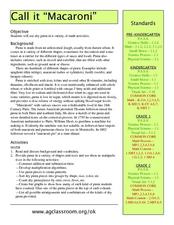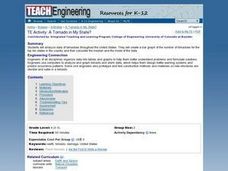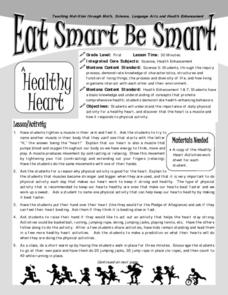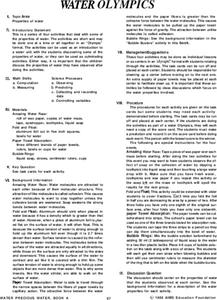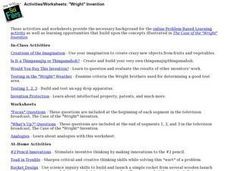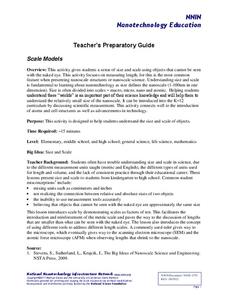Baylor College
Dust Catchers
In class, your emerging environmentalists construct dust catchers. They take them home for a week or two, and then bring them back into class to examine under a magnifier. From this activity, they learn what makes up dust and that...
National Nanotechnology Infrastructure Network
Noodling Around: Powers of Ten
How many noodles long is your classroom? Find out when engineers of all ages explore measurement through the use of pool noodles. With the noodles pre-cut to certain metric lengths, the activities could be used to introduce the metric...
Baylor College
How Can We Find Out What Is in Water?
Using paper chromatography, water watchers discover that several substances might be dissolved even though they aren't visible. For this case, you will prepare a mixture of three different food colorings for them to experiment with. A...
Curated OER
Egg Hunt Reinforces Math, Language Skills
It's amazing what you can do to reinforce math skills while leading an egg hunt! Learners of all ages will benefit from playing this simple game.
Curated OER
Aerobic And Anaerobic Activity
Third graders engage in the study of aerobic and anaerobic activities. They discuss the differences in the type of exercises involved. Students identify the types of activities they enjoy based upon the information given. Then students...
Curated OER
Reading Charts
How well can your third graders interpret data from a chart? Use this straightforward worksheet to reinforce problem-solving skills. After reading a school schedule, pupils answer ten questions about the information in the chart. A great...
Curated OER
Call it "Macaroni"
Who knew there were so many fun educational opportunities featuring pasta? Scholars read a brief informational text about the history of pasta (note that "macaroni" is spelled two different ways, so address this if kids are reading...
Lee & Low Books
First Come the Zebra Teacher’s Guide
Accompany a reading of First Come the Zebra written and illustrated by Lynne Barasch with a teacher's guide equipped with before reading, vocabulary, and after reading activities. Additional social studies,...
New York City Department of Education
Chris’ Garden Dilemma
Make the connections between area, tiling, and multiplication. A performance task and associated unit presents the concept of area and makes the connection to multiplication. Pupils work through three major sections of instruction that...
Curated OER
TE Activity: A Tornado in My State?
Students study data about tornadoes in the United States while completing a worksheet. They develop a bar graph showing the number of tornadoes for the top ten states in the US. They find the median and mode of the data set.
Curated OER
Activity Guide for Snow
Create a cross-curricular learning experience around a shared reading of Cynthia Rylant's book Snow. From writing poetry and a singing a song about snow, to creating paper snowflakes and solving math story problems, this resource...
Curated OER
Where Did the Bunny Leave the Eggs? Picture Graphing Activity
The Easter Bunny left us a bunch of eggs, but how many did he leave? Learners use the data to create a picture graph, interpret it, and answer the questions that follow. There's even easy egg cut-outs for your youngsters!
Montana Office of Public Instruction
Eat Smart Be Smart
Get children's blood pumping with this primary grade lesson on the human heart. After learning about the important role this muscle plays in the human body, students monitor their heart rates and discover the importance of...
Teach Engineering
Solar Power
Elementary schoolers discover how engineers use solar energy to heat buildings. They take a close look at some of the materials used: sand, salt, water, and shredded paper and evaluate the efficiency of each material. An incredible...
Curated OER
Water Olympics
A fascinating and engaging lesson on the properties of water awaits you. In it, learners engage in four activities that are designed to teach about the properties of water. This exciting plan has worksheets embedded in it which make the...
Curated OER
Learning About Inventions
This site contains a variety of worksheets and activities to supplement the on-line problem-based learning activity about how imagination and how inventions are created. TheWright Brothers are used as a case study. The links and...
National Nanotechnology Infrastructure Network
Scale Models
With instructions to adapt the activities for any grade K-12, any teacher can incorporate the concept of scale into the classroom with a simple, yet effective lesson.
Baylor College
Gases Matter
As a demonstration or as a hands-on activity, your class watches as the combination of vinegar and baking soda produce carbon dioxide gas. The intent of the lesson is to help youngsters understand that gases occupy space. It is included...
Baylor College
Water: Post-Assessment
Very simply, the science class will discuss what they have learned during The Science of Water unit and take a multiple-choice post-assessment quiz. A few other closing activities are suggested for you to choose from, such as having...
Baylor College
What's Is Soil Made Of?
It's time to roll up those sleeves and get a little dirty in the second lesson of this series on the science of food. Investigate where plants and animals get the minerals they need to live in this two-part exploration of soil. First,...
Baylor College
Your Energy Needs (BMR)
How many Calories one needs on a daily basis is dependent on a number of factors including gender, height, and activity level. In the third of seven lessons about energy and food, young nutritionists calculate the number of Calories...
Baylor College
How Much Water Do Humans Need?
Physical or life science learners measure the amounts of water eliminated by intestines and the urinary system, and the amounts lost via respiration and perspiration. In doing so, they discover that the body's water must be replenished...
Baylor College
Bio Build-up
Trace pollutants through the environment in the seventh lesson of this series on the science of food. Looking at a picture of the plants and animals in an aquatic ecosystem, learners use dot stickers to represent harmful chemicals as...
Baylor College
They're Everywhere: Bacteria
Totally gross out your class with the eighth lesson in this series on food science. Explore the microscopic world of bacteria by taking swabs of different classroom objects and growing colonies in petri dishes. An engaging activity that...






